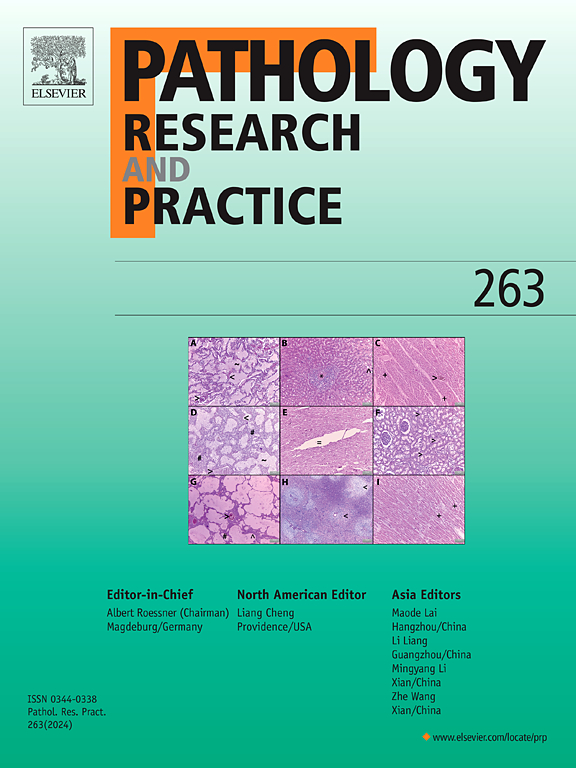FGFR3 immunohistochemistry as a surrogate biomarker for FGFR3 alterations in urothelial carcinoma
IF 2.9
4区 医学
Q2 PATHOLOGY
引用次数: 0
Abstract
FGFR3 alterations are common in urothelial carcinoma (UC) and have implications both in prognosis and treatment. FGFR3 analysis is the current gold standard, but limitations as cost, turnaround time or accessibility may exist. FGFR3 immunohistochemistry (IHC) could provide a faster and more cost-effective identification of FGFR3 alterations. The aim of this study was to establish the accuracy of FGFR3 IHC as a surrogate biomarker for FGFR3 variants in UC. We retrospectively reviewed 41 UC patients from an institutional database selected by stratified random sampling based on presence of muscle invasion and FGFR3 variants. FGFR3 genetic analysis had been stablished through quantitative polymerase chain reaction. FGFR3 IHC was performed using a FGFR3 mouse monoclonal antibody and blindly evaluated by three independent pathologists. Results were dichotomised into positive (membrane and cytoplasm positivity even in small foci of cells) or negative categories. The cohort included 37 patients with bladder cancer and four with upper tract urinary carcinoma (UTUC). Twenty-two patients had muscle-invasive tumours (11 without and 11 with FGFR3 variants), while the other 19 had non-muscle-invasive disease (10 without and 9 with FGFR3 variants). FGFR3 IHC exhibited 80 % sensitivity, 95 % specificity, 94 % PPV and 83 % NPV to detect FGFR3 variants. There was concordance among the three pathologists in 78 % of samples, which traduces a substantial agreement with a Fleiss’ kappa statistic of 0.7. Our study suggests that FGFR3 IHC is feasible and could potentially eliminate the need for genetic testing in patients with positive immunohistochemical results. Our findings support a dichotomic evaluation for FGFR3 IHC, which has the potential to enhance reproducibility compared to more complex scoring systems. Still, further research is needed to validate this proposed diagnostic algorithm.
FGFR3免疫组织化学作为尿路上皮癌中FGFR3改变的替代生物标志物
FGFR3改变在尿路上皮癌(UC)中很常见,并且对预后和治疗都有影响。FGFR3分析是目前的黄金标准,但可能存在成本、周转时间或可及性方面的限制。FGFR3免疫组织化学(IHC)可以提供一种更快、更经济的FGFR3改变鉴定方法。本研究的目的是确定FGFR3 IHC作为UC中FGFR3变异的替代生物标志物的准确性。我们回顾性地回顾了41例UC患者,这些患者来自一个机构数据库,是通过分层随机抽样选择的,基于存在肌肉侵犯和FGFR3变异。通过定量聚合酶链反应建立了FGFR3基因分析。使用FGFR3小鼠单克隆抗体进行FGFR3免疫组化,并由三名独立病理学家进行盲法评估。结果分为阳性(即使在小灶细胞中膜和细胞质也呈阳性)和阴性两类。该队列包括37例膀胱癌患者和4例上尿路癌(UTUC)患者。22名患者患有肌肉侵袭性肿瘤(11名无FGFR3变异,11名有FGFR3变异),而其他19名患者患有非肌肉侵袭性疾病(10名无FGFR3变异,9名有FGFR3变异)。FGFR3 IHC检测FGFR3变体的灵敏度为80% %,特异性为95% %,PPV为94% %,NPV为83% %。在78. %的样本中,三位病理学家之间存在一致性,这与Fleiss kappa统计值0.7的实质性一致。我们的研究表明FGFR3免疫组化是可行的,并且有可能消除对免疫组化结果阳性患者进行基因检测的需要。我们的研究结果支持FGFR3 IHC的二分法评估,与更复杂的评分系统相比,这有可能提高可重复性。然而,需要进一步的研究来验证所提出的诊断算法。
本文章由计算机程序翻译,如有差异,请以英文原文为准。
求助全文
约1分钟内获得全文
求助全文
来源期刊
CiteScore
5.00
自引率
3.60%
发文量
405
审稿时长
24 days
期刊介绍:
Pathology, Research and Practice provides accessible coverage of the most recent developments across the entire field of pathology: Reviews focus on recent progress in pathology, while Comments look at interesting current problems and at hypotheses for future developments in pathology. Original Papers present novel findings on all aspects of general, anatomic and molecular pathology. Rapid Communications inform readers on preliminary findings that may be relevant for further studies and need to be communicated quickly. Teaching Cases look at new aspects or special diagnostic problems of diseases and at case reports relevant for the pathologist''s practice.

 求助内容:
求助内容: 应助结果提醒方式:
应助结果提醒方式:


